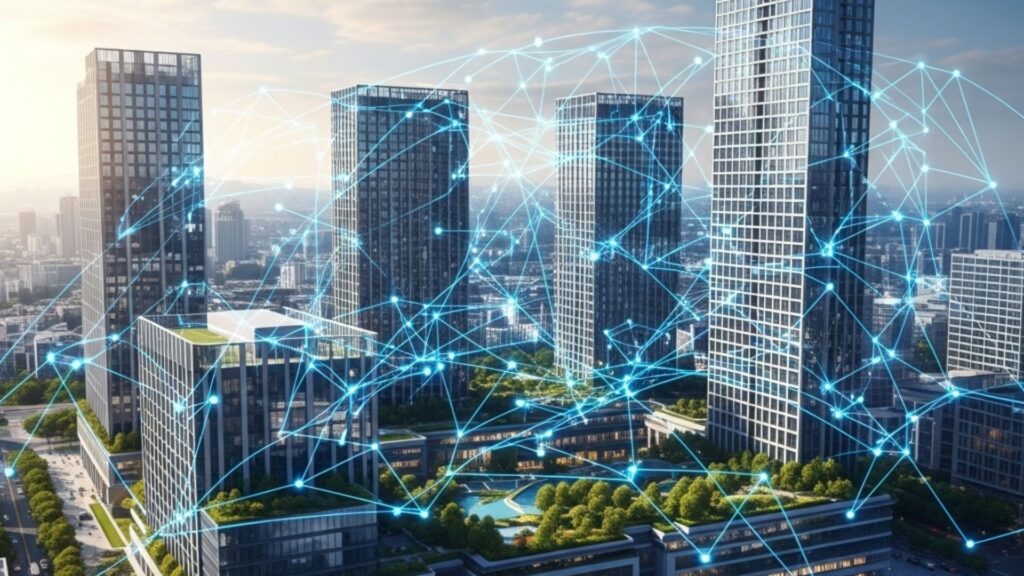The Indian real estate market is entering a new era of digital transformation. One of the most groundbreaking developments is Real Estate Tokenization, a method that uses blockchain technology to convert physical property ownership into digital tokens. This innovation aims to make real estate investments more accessible, secure, and liquid.
This article explains real estate tokenization in simple terms, covering how it works, its legal standing in India, and why investors and property owners should pay attention.

Table of Contents
What is Real Estate Tokenization?
Real Estate Tokenization is the process of representing ownership of real-world properties as digital tokens on a blockchain. Each token represents a fractional share of a property. These tokens can be bought, sold, or traded, much like stocks or other digital assets.
For example, if a commercial building worth ₹10 crore is tokenized into 10,000 tokens, each token would represent ownership of ₹1 lakh in that property.
How Does Real Estate Tokenization Work?
The process of real estate tokenization typically involves the following steps:
- Property Selection and Valuation: A verified property is selected, and its value is assessed.
- Legal Structuring: Legal entities or special purpose vehicles (SPVs) are created to hold the property.
- Token Creation: Blockchain tokens are generated, representing ownership fractions.
- Token Distribution: Investors can buy tokens through a digital platform.
- Ongoing Management: Income (like rent) and asset appreciation are distributed proportionally to token holders.
This system is powered by smart contracts, which automate rent distribution, asset transfers, and compliance checks.
Benefits of Real Estate Tokenization
Tokenizing real estate offers several advantages to both investors and developers:
1. Fractional Ownership
With real estate tokenization, investors can start with smaller amounts, making high-value assets like commercial real estate more accessible to a broader group of people.
2. Improved Liquidity
Unlike traditional property, tokenized assets can be traded on secondary markets, giving investors an exit opportunity without selling the whole property.
3. Transparency and Security
Since data is stored on a blockchain, all transactions and ownership records are transparent and tamper-proof.
4. Faster Transactions
Smart contracts reduce paperwork and manual intervention, accelerating property transfers, rent distributions, and compliance verification.
Legal and Regulatory Status in India
While real estate tokenization is gaining interest, it operates in a cautious legal environment in India. The Securities and Exchange Board of India (SEBI) and Reserve Bank of India (RBI) have not yet issued dedicated guidelines for tokenized real estate.
However, tokenization is generally legal if it complies with:
- Real Estate (Regulation and Development) Act (RERA)
- Foreign Exchange Management Act (FEMA)
- SEBI’s Collective Investment Schemes guidelines
- Companies Act, 2013
Entities launching tokenized assets must structure offerings carefully, using regulated financial vehicles like REITs (Real Estate Investment Trusts) or SPVs to remain compliant.
Key Use Cases in India
1. Commercial Real Estate Investments
Tokenization enables access to premium commercial spaces in cities like Mumbai, Delhi, and Bengaluru without requiring crores in capital.
2. Real Estate Crowdfunding
Platforms can pool funds from multiple investors using tokenization, allowing collective ownership and reducing individual risk.
3. Land Ownership and Agriculture
Tokenizing farmland or plotted developments offers better transparency and easier record maintenance—especially helpful for rural property markets.
Challenges and Risks
Despite its promise, real estate tokenization faces a few hurdles:
- Regulatory Uncertainty: India lacks a defined legal framework for tokenized real estate.
- Market Adoption: General awareness and trust in blockchain technology are still low among Indian property buyers.
- Technology Infrastructure: Reliable platforms, legal safeguards, and digital identity systems are still evolving.
Addressing these challenges is crucial to the widespread adoption of real estate tokenization.
Future Outlook of Real Estate Tokenization in India
The future of real estate tokenization in India looks promising, especially with the government’s push toward digital governance and smart contracts. As blockchain adoption grows and legal clarity improves, tokenization could redefine how Indians buy, sell, and manage properties.
By reducing entry barriers and increasing transparency, this model could significantly contribute to urban housing development, smart city projects, and fractional ownership models.
Role of Platforms like Openplot
Platforms like Openplot play an important role in educating Indian property buyers and investors about emerging trends such as real estate tokenization. By offering accurate, verified property listings and publishing insightful blogs, Openplot helps users stay informed about legal, financial, and technological developments in real estate.
While Openplot does not facilitate tokenized property transactions, it serves as a reliable source of guidance for those exploring innovative ownership models, including tokenization. As the market evolves, Openplot remains committed to simplifying real estate knowledge and helping users make informed decisions.
Conclusion
Real estate tokenization is more than a tech trend—it’s a shift in how we think about property ownership and investment. While India is still in the early stages of this transformation, the foundation is being laid for a more democratic, liquid, and efficient real estate market.
Investors, developers, and platforms like Openplot should keep a close eye on this innovation, as it holds the potential to revolutionize India’s property landscape in the years ahead.
Frequently Asked Questions
Q1. Is real estate tokenization legal in India?
It is not explicitly regulated, but it can be structured within existing financial and property laws like RERA and SEBI’s investment rules.
Q2. Can I invest in real estate tokenization with small capital?
Yes, fractional ownership allows you to start with as little as a few thousand rupees, depending on the platform.
Q3. Is blockchain safe for real estate ownership?
Blockchain is considered highly secure due to its decentralized and immutable structure.
Q4. Will tokenized property give me rental income?
Yes, rental income is distributed to token holders proportionally, often automated via smart contracts.